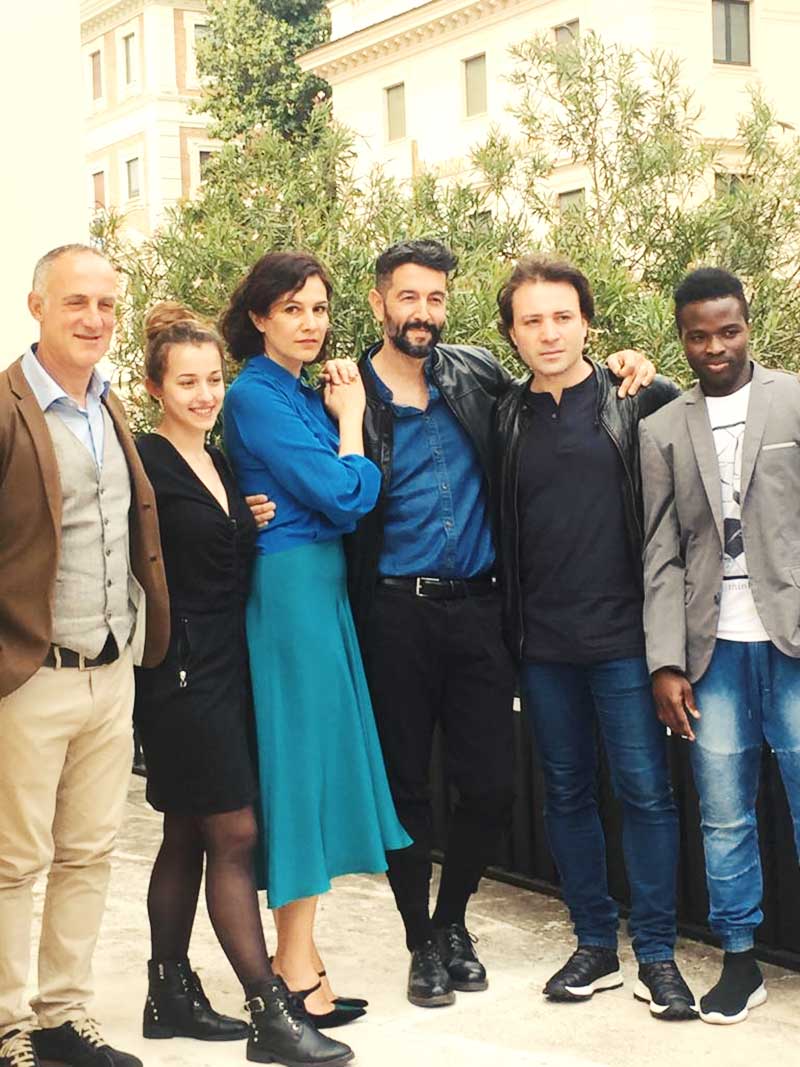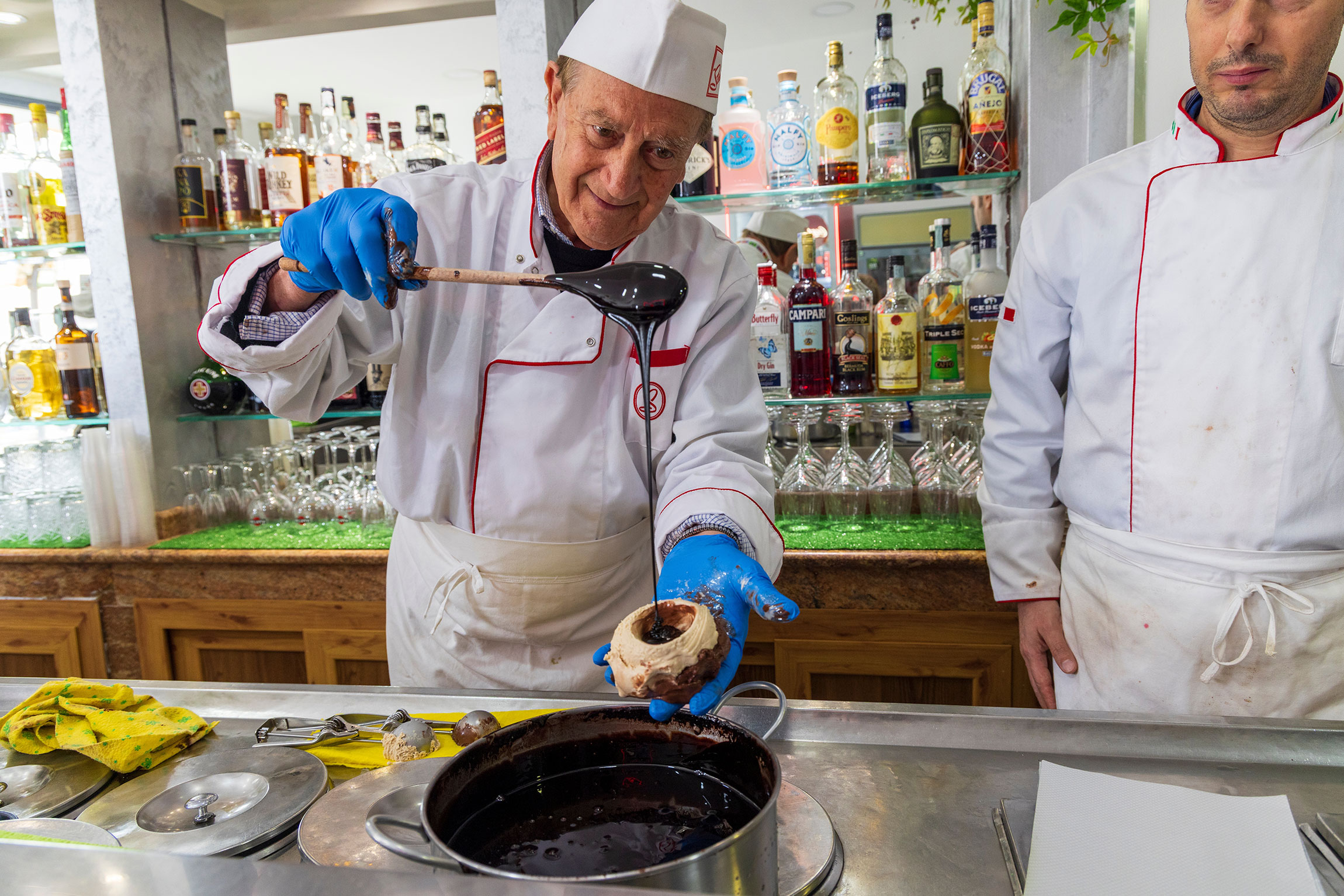The new film from director Laura Luchetti, Twin Flower (Fiore Gemello) explores unlikely friendships and the loss of innocence, set against the starkly beautiful landscape of Sardinia. The film had its American premiere in May during the Seattle International Film Festival.
Luchetti cast two first-time actors — Anastasiya Bogach as Anna and Kalil Kone as Basim – in the lead roles, using their real-life personal stories and diverse backgrounds to add authenticity to their on-screen characters. In the film, Anna is on-the-run, trying to escape from a human trafficker who has murdered her father. The crime traumatized her into silence and her character speaks very little throughout the film.
Along the way, Anna encounters Basim, an illegal immigrant from the Ivory Coast who is being pursued by the Italian police. The two teenagers are as different as can be. They don’t speak the same language, share the same religion or understand each other’s culture. What they have in common is the traumatic experience of leaving their homes and all things familiar to go in search of freedom, safety and a better future. Together, they form a powerful bond of friendship and trust as they run for their lives.

Laura Lucchetti
Born in Rome, film maker Laura Luchetti lived in London for many years. She earned a degree in international political science, intending to become a diplomat. Instead, her career took a different turn and she found her way into film-making.
“I like telling stories,” said Luchetti, “and I think telling a story with images is one of the most beautiful ways to communicate. Many things interest me. I am a very curious person. Small details fascinate me as do all the tiny things that live in the realm between the real and the unreal.”
Luchetti’s career to date is marked by its diversity. She has made short films, music videos, commercials and documentaries as well as writing and directing two theater productions based on classical music. She directed and produced a documentary for director Anthony Minghella following his 2003 film, Cold Mountain. She worked as production secretary on The Talented Mr. Ripley (1999) and as Russell Crowe’s assistant on Proof of Life (2000).

Twin Flower had its American premiere in late May at the Seattle International FIlm Festival, the largest and most attended film festival in the U.S. (SIFF)
Her first long-feature film, a 2010 Italian romantic comedy called Hay Fever, was selected for several international festivals, and for the past four years, she’s devoted much of her attention to stop-motion animation. Her animated film Sugarlove was selected last year for the Venice Festival Critics’ Week.
Luchetti characterizes Twin Flower as a drama about innocence, a story very much rooted in today’s realities. “I am naturally drawn to stories about lost innocence and the struggle to regain it,” she told the film website Women and Hollywood. “My two protagonists are trying to escape from a reality that hurt them…Currently, around the world, there are millions of kids like them who don’t have a voice.”
Luchetti’s approach to telling this story is one rooted in realism and simplicity. Her determination to provide a credible voice led to her decision to use non-professional actors in the lead roles. To find the right pair, Luchetti interviewed many individuals, male and female, looking for that special combination of intelligence, passion and emotional accessibility. The two young people she cast, like their on-screen characters, had each survived great emotional upheaval and a significant geographic journey.

The cast of Twin Flower met in Rome during a press conference recently. Actor Anastasiya Bogach and director Laura Luchetti are second and third from left; actor Kalil Kone is on the far right. (Laura Luchetti)
Anastasiya Bogach, originally from the Ukraine, moved to Italy when she was young. She had to learn a new language and adapt to a new culture and customs. Kalil Kone’s past is very similar to the character he plays in the film. He left the Ivory Coast, walking hundreds of miles through Africa until he reached Libya. There, he got on a boat, risking his life for a better future. He arrived safely in Sardinia but some of his fellow travelers did not make it.
Luchetti got the idea for the film several years ago when she heard a story from a young girl who had escaped from a violent past. As she started to develop the story line – the film took about five years from concept to completion – she discovered that thousands of young people go missing every year. Many like Basim arrive in a new country as fugitives without documents, identification or family networks. They are forced to simply disappear into their new environment.
In Twin Flower, this environment is very much a part of the film. The setting for the story – Sardinia, the second-largest island in the Mediterranean – is a defining force. Its harsh yet breathtaking landscape offers shelter and also poses a danger for the two young protagonists. Sun-baked landscapes, wind and rain storms, buzzing and crawling insects all add atmosphere, realism and a distinctive sound track to the film.
“I chose this environment and these protagonists because this is the strongest thing that is happening now in Italy,” said Luchetti. “It is what our country is living now.”
Although the story of Anna and Basim is one that takes place in many places around the world where suspicion, fear and hatred reign, Luchetti hopes to leave audiences with a message of hope. “Often differences can bring people together,” she said. “A relationship can exist between two people who have nothing in common – not language, nor culture, nor religion. But one relationship can make all the difference. One relationship can change lives.”
Il nuovo film della regista Laura Luchetti, Twin Flower – Fiore gemello, esplora amicizie improbabili e la perdita dell’innocenza, ambientandole nel meraviglioso paesaggio della Sardegna. Il film ha avuto la sua prima americana a maggio durante il Seattle International Film Festival.
Luchetti ha scelto due attori alle prime armi – Anastasiya Bogach nei panni di Anna, e Kalil Kone nei panni di Basim – per i ruoli principali, usando le loro storie personali e sfondi diversi per aggiungere autenticità ai loro personaggi sullo schermo. Nel film, Anna è in fuga, cerca di scappare da un trafficante di esseri umani che ha assassinato suo padre. Il crimine la riduce al silenzio e il suo personaggio parla molto poco durante il film.
Lungo la strada, Anna incontra Basim, immigrato clandestino proveniente dalla Costa d’Avorio che viene perseguitato dalla polizia italiana. I due ragazzi sono molto diversi. Non parlano la stessa lingua, non condividono la stessa religione nè comprendono la cultura dell’altro. Quello che hanno in comune è l’esperienza traumatica di lasciare le loro case e tutte le cose a loro familiari per andare alla ricerca della libertà, della sicurezza e di un futuro migliore. Insieme formano un potente legame di amicizia e di fiducia mentre seguono le loro vite.
Nata a Roma, la regista Laura Luchetti ha vissuto a Londra per molti anni. Ha conseguito una laurea in scienze politiche internazionali, con l’intenzione di diventare diplomatica. Invece, la sua carriera ha preso una piega diversa e ha trovato la sua strada nel cinema.
“Mi piace raccontare storie”, ha detto Luchetti, “e penso che raccontare una storia con le immagini sia uno dei modi più belli di comunicare. Molte cose mi interessano. Sono una persona molto curiosa. Piccoli dettagli mi affascinano come tutte le piccole cose che vivono nel regno tra il reale e l’irreale”.
La carriera di Luchetti fino ad oggi è stata segnata dalla diversità. Ha realizzato cortometraggi, video musicali, pubblicità e documentari oltre a scrivere e dirigere due produzioni teatrali basate sulla musica classica. Ha diretto e prodotto un documentario per il regista Anthony Minghella seguendo il suo film del 2003, Cold Mountain. Ha lavorato come segretaria di produzione in Il talento di Mr. Ripley (1999) e come assistente di Russell Crowe in Proof of Life (2000).
Il suo primo lungometraggio, una commedia romantica italiana del 2010, Hay Fever – Febbre da fieno, è stato selezionato per numerosi festival internazionali e negli ultimi quattro anni ha dedicato molta attenzione all’animazione stop-motion. Il suo film d’animazione Sugarlove è stato selezionato l’anno scorso per la Settimana della Critica del Festival di Venezia.
Luchetti caratterizza Twin Flower come un dramma sull’innocenza, una storia molto radicata nella realtà di oggi. “Sono naturalmente attratta da storie sull’innocenza perduta e sulla lotta per riconquistarla”, ha detto al sito web cinematografico Women and Hollywood. “I miei due protagonisti stanno cercando di fuggire da una realtà che li ferisce … Attualmente, in tutto il mondo, ci sono milioni di giovani come loro che non hanno voce”.
L’approccio di Luchetti nel raccontare questa storia è radicato nel realismo e nella semplicità. La sua determinazione nel fornire una voce credibile ha portato alla decisione di utilizzare attori non professionisti per i ruoli principali. Per trovare la coppia giusta, Luchetti ha intervistato molti individui, maschi e femmine, alla ricerca di quella speciale combinazione di intelligenza, passione e accessibilità emotiva. I due giovani che ha scelto, come i loro personaggi sullo schermo, sono sopravvissuti a grandi sconvolgimenti emotivi e a un significativo viaggio geografico.
Anastasiya Bogach, originaria dell’Ucraina, si è trasferita in Italia quando era giovane. Ha dovuto imparare una nuova lingua e adattarsi a una nuova cultura e a nuovi costumi. Il passato di Kalil Kone è molto simile al personaggio che interpreta nel film. Ha lasciato la Costa d’Avorio, camminando per centinaia di chilometri attraverso l’Africa fino a raggiungere la Libia. Lì, è salito su una barca, rischiando la vita per un futuro migliore. E’ arrivato sano e salvo in Sardegna ma alcuni dei suoi compagni di viaggio non ce l’hanno fatta.
Luchetti ha avuto l’idea del film diversi anni fa quando ha sentito la storia di una ragazza che era sfuggita a un passato violento. Quando ha iniziato a sviluppare la trama – il film ha impiegato circa cinque anni dall’ideazione alla realizzazione – ha scoperto che migliaia di giovani scompaiono ogni anno. Molti come Basim arrivano in un nuovo paese come fuggiaschi senza documenti, identificazione o reti familiari. Sono semplicemente costretti a sparire nel loro nuovo ambiente.
In Twin Flower, questo ambiente è parte integrante del film. L’ambientazione per la storia – la Sardegna, la seconda isola più grande del Mediterraneo – è una forza determinante. Il suo paesaggio aspro ma mozzafiato offre riparo ma rappresenta anche un pericolo per i due giovani protagonisti. Paesaggi infuocati dal sole, tempeste di vento e pioggia, insetti ronzanti e striscianti aggiungono atmosfera, realismo e una colonna sonora distintiva al film.
“Ho scelto questo ambiente e questi protagonisti perché questa è la cosa più forte che sta accadendo ora in Italia”, ha detto Luchetti. “È quello che il nostro paese sta vivendo adesso”.
Anche se la storia di Anna e Basim è quella che si svolge in molti luoghi in tutto il mondo dove regnano il sospetto, la paura e l’odio, Luchetti spera di lasciare al pubblico un messaggio di speranza. “Spesso le differenze possono unire le persone”, ha detto. “Può esistere una relazione tra due persone che non hanno nulla in comune – nè lingua, né cultura, né religione. Ma una relazione può fare la differenza. Una relazione può cambiare la vita”.


































